Have you ever noticed how your mind plays tricks on you when betting? Let’s be honest, our brains aren’t always the reliable decision-makers we think they are, especially when money’s on the line. You might sit there, totally convinced you’re making smart choices based on careful research, but there’s actually a lot more going on under the surface.
Think about it this way: we all know that friend who swears the roulette ball has to land on red after five blacks in a row. Or maybe you’ve caught yourself thinking, “Just one more bet, I can feel my luck changing.” These aren’t random thoughts. They’re cognitive biases at work, and they’re incredibly sneaky.
You know what’s really interesting? Even the most experienced bettors fall into these mental traps. It’s like our brains have these built-in shortcuts that seem helpful but actually lead us down the wrong path. Take the classic case of chasing losses, for instance. We’ve all been there, throwing good money after bad because we just can’t accept that sometimes things don’t go our way.
The truth is, these mental quirks can punch holes in even the most solid betting strategy. It’s not just about knowing the odds or studying the stats. A big part of smart betting is recognizing when your brain might be nudging you toward decisions that feel right but don’t make logical sense. Pretty wild how our minds can work against us sometimes, right?
Common Cognitive Biases in Gambling
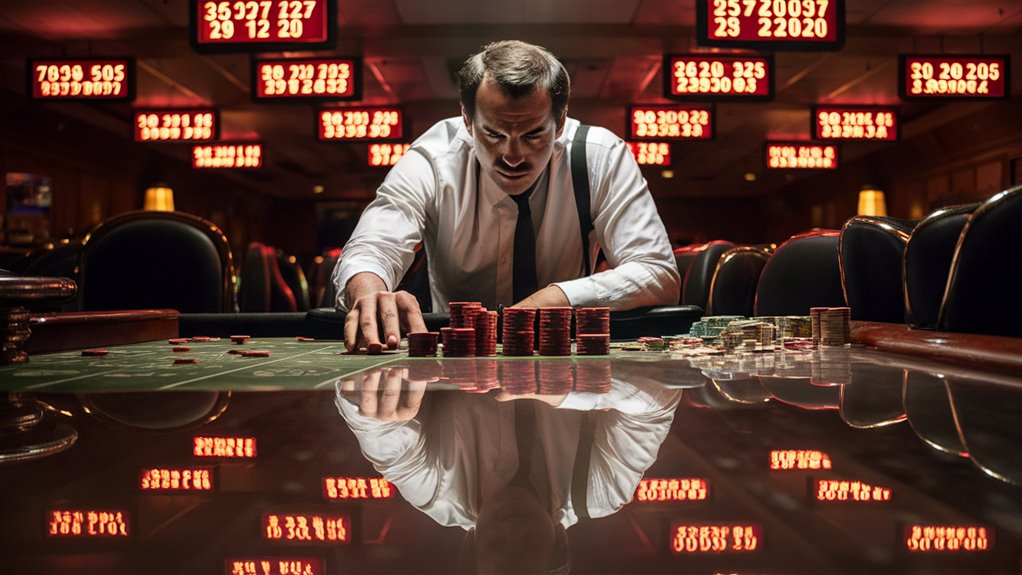
Let’s talk about three sneaky mental traps that often catch gamblers off guard. You know how our brains can play tricks on us? Well, these biases are perfect examples of that.
First up is the gambler’s fallacy, and it’s a tricky one. Ever sat at a roulette table and thought, “Red has come up six times in a row, black has got to be next”?
That’s your brain falling for this classic trap. The truth is, each spin is completely independent, just like flipping a coin – what happened before doesn’t influence what comes next.
Then there’s confirmation bias, which basically means we see what we want to see. Think about your favorite sports team to bet on.
If they win, you probably remember every detail of that victory. But those losses? They tend to fade into the background pretty quickly.
This selective memory makes us feel like we’re better at picking winners than we actually are.
The third one is really interesting – the illusion of control. Ever blown on dice for luck or worn your lucky socks to the casino?
We all love to think we can somehow influence random events. Maybe you’ve even created an elaborate betting system that you’re sure will beat the house.
Spoiler alert: the math doesn’t care about our lucky charms or clever strategies.
These mental shortcuts work together like partners in crime. When you’re placing bets, your brain might be using all three at once without you even realizing it.
The result? We make choices based on feelings and false patterns rather than actual probability and logic. It’s just how we’re wired, but being aware of these biases is the first step in making smarter gambling decisions.
The Gambler’s Fallacy Explained
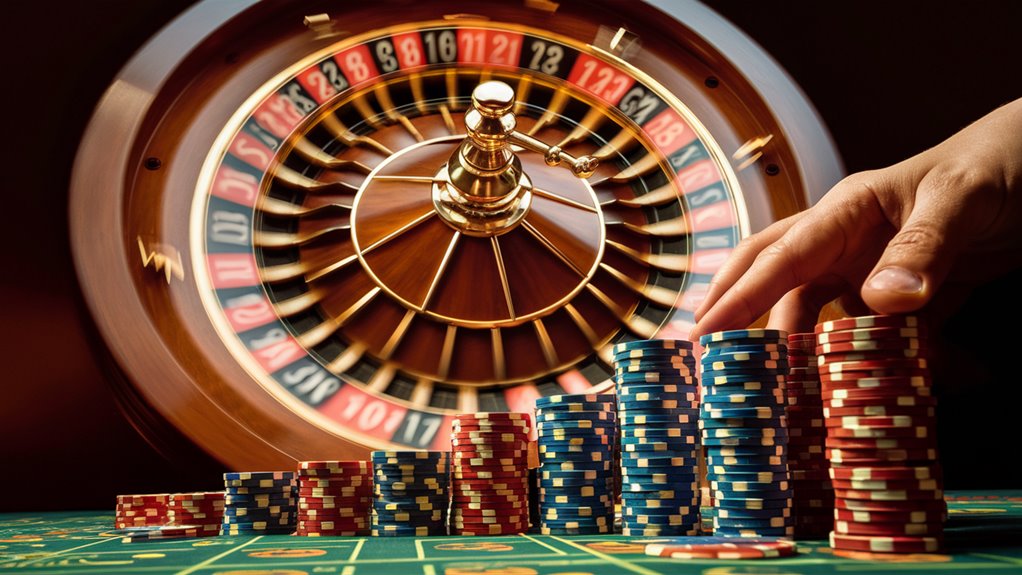
Let’s talk about the gambler’s fallacy, one of those psychological traps that can really mess with your head when you’re betting. You know how our brains love to find patterns? Well, this is where it can get us into trouble.
Picture this: you’re standing at a roulette table, watching red come up five times in a row. Your gut tells you black must be coming up next, right? That’s the gambler’s fallacy in action.
It’s like thinking that after five heads in a row, a coin flip just has to give you tails.
Our minds naturally want everything to balance out, almost like the universe owes us something. But here’s the thing, probability doesn’t work that way.
Each spin, roll, or flip is brand new, with no memory of what happened before. It’s kind of like how your coffee maker doesn’t remember how many cups it made yesterday, it just makes coffee every time you press the button.
Want to know if you’re falling for this trap? Watch out for thoughts like “I’m due for a win” or “This slot machine is running cold.” These are red flags that your brain is trying to create patterns where none exist.
The truth is, those dice or cards don’t care about your losing streak.
To keep your betting decisions smart and rational, remember this simple fact: probability doesn’t have a memory. Just because you’ve lost five times doesn’t mean your sixth try has any better odds.
Understanding this mightn’t make gambling more profitable, but it’ll definitely help you make clearer decisions based on real odds rather than wishful thinking.
Overcoming Confirmation Bias
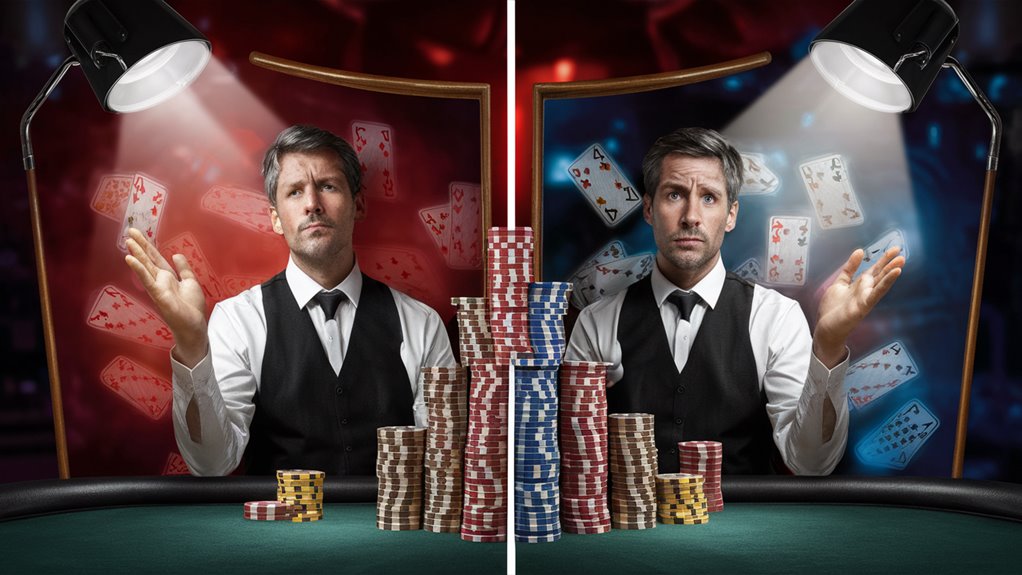
Let’s talk about confirmation bias, something we all struggle with when making betting decisions. You know how it goes – when you’re absolutely sure a team’s going to win, you suddenly start seeing all these “signs” that prove you right.
Maybe you’re focusing on their amazing winning streak while conveniently forgetting about their recent injuries or tough upcoming schedule.
Breaking free from this mental trap isn’t easy, but it’s definitely doable. First things first, try playing devil’s advocate with yourself. Take a moment to jot down why your betting hunch might be completely wrong.
It sounds counterintuitive, right? But that’s exactly what makes it effective. Look for stats that challenge what you think you know, and pay attention to those experts who disagree with your prediction, even if it makes you a bit uncomfortable.
Here’s a practical tip: start keeping a betting journal. Not just any journal, but one where you write down both sides of the story for each bet.
Think of it as creating a mini debate in your head. Before you put any money down, run through a quick mental checklist. How’s the weather looking for game day? What about those key players who’ve been a bit shaky lately?
Are you maybe getting too excited about recent wins while ignoring some red flags?
The real pros in betting aren’t just lucky, they’re thorough. They look at everything, especially the stuff that doesn’t fit their initial thoughts.
So next time you catch yourself brushing off information just because it doesn’t match what you want to believe, take a step back. Ask yourself why you’re so quick to dismiss it.
Loss Aversion and Risk Management
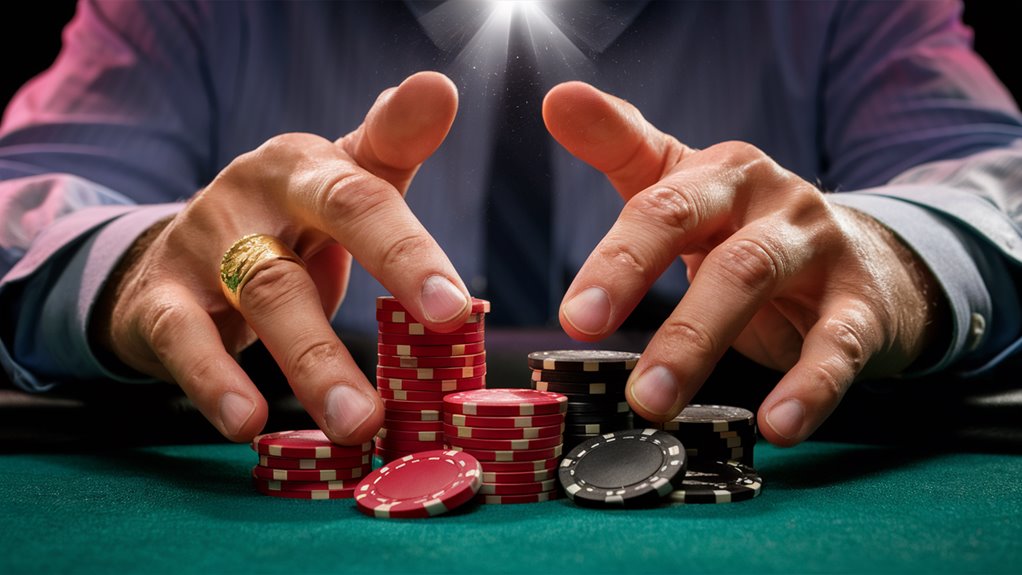
Let’s talk about something we’ve all experienced – that gut-wrenching feeling when we see our money slipping away. You know how it goes, right?
Our brains are wired to feel losses much more intensely than wins, and this can really mess with our decision-making when betting.
Think of it like touching a hot stove. Once burned, we become super cautious about touching it again. The same happens with betting losses – they can trigger such strong emotions that we end up making choices based on fear rather than logic.
Maybe you’ve caught yourself doubling down after a loss or placing bigger bets to “make up for it.” We’ve all been there.
But here’s the thing about successful betting: it’s all about staying cool under pressure. You need a solid game plan, just like a pilot has a pre-flight checklist.
Start by setting clear limits for yourself – both for each betting session and your overall bankroll. These aren’t just suggestions; they’re your safety nets.
Remember when your mom told you not to swim right after eating? Well, betting right after a loss is kind of similar – it’s best to take a step back and cool off.
Keep your bet sizes consistent, no matter what happened in your last wager. If you notice yourself getting that urge to place bigger bets after losing, take a breather and maybe log out for a while.
Success in betting isn’t about avoiding losses completely – that’s just not realistic. It’s about managing them smartly and keeping your emotions in check.
Try keeping a betting diary to spot patterns in your behavior. Are you betting more when you’re stressed? Making snap decisions after a losing streak?
Getting to know these patterns is your first step toward breaking them.
Emotional Decision Making in Betting
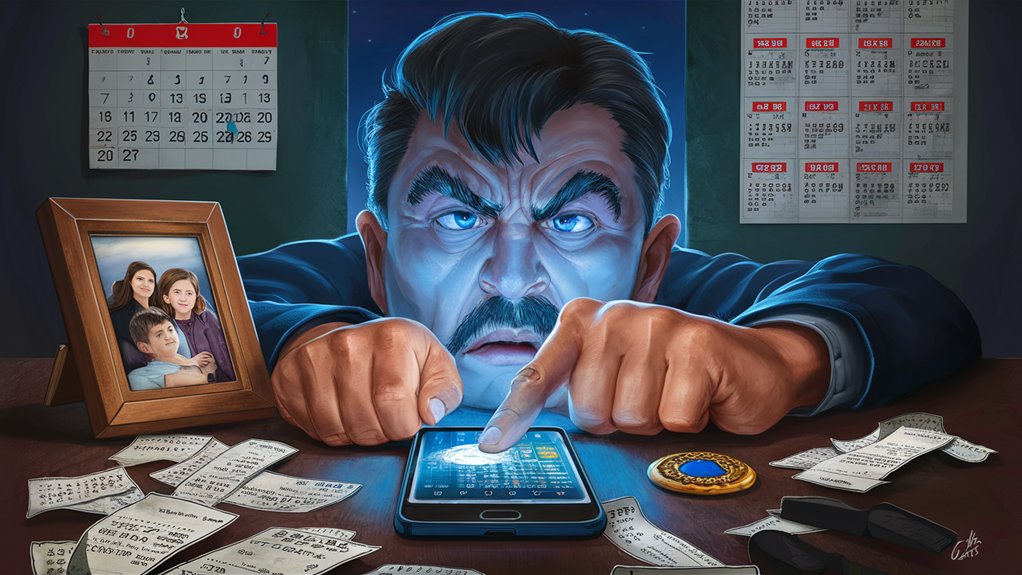
Let’s talk about how our emotions can really mess with our betting decisions, even if we think we’re pros at this game.
You know that feeling when you’re on a winning streak or trying to bounce back from a loss? That’s when things can get tricky, and before you know it, your carefully planned strategy goes right out the window.
Think of it like driving a car while incredibly angry or excited. Sure, you might know all the rules of the road, but those strong emotions can make you take unnecessary risks or become overly cautious.
The same thing happens in betting, especially when fear and greed start calling the shots.
Have you ever caught yourself doing any of these? Trying to win back your losses with bigger, riskier bets (we’ve all been there), feeling invincible after a few wins and betting more than usual, or maybe placing contradictory bets just to feel “safe.” These are classic signs that emotions are steering your betting decisions.
So how do we fix this? Well, it’s all about creating a solid routine that keeps those emotions in check.
Picture it like having a cooling-off period after an argument 온카스터디 먹튀검증 you need that same kind of pause between bets. Set strict limits on how much you’ll stake, just like you might set a budget for shopping.
And here’s a helpful tip: keep a betting diary. It might sound a bit strange, but jotting down how you felt when making certain bets can reveal some pretty surprising patterns in your decision-making.
Remember, the goal isn’t to become an emotionless betting robot. It’s about recognizing when your feelings are taking over and having a game plan to stay on track.
After all, the best betting decisions come from a clear head, not a racing heart.
Breaking Free From Mental Traps
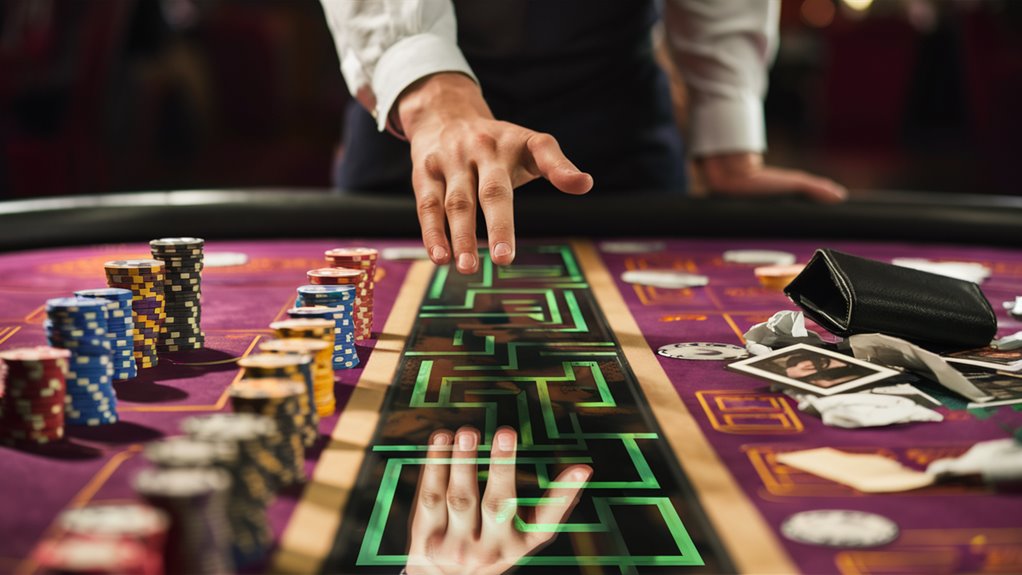
Let’s talk about those pesky mental traps that can catch any of us off guard when making decisions. You know how it goes – even the sharpest minds can get tangled up in patterns of thinking that feel like quicksand.
But don’t worry, there are practical ways to break free and get your decision-making back on track.
First things first, we need to be honest with ourselves about our biases. Ever noticed how you might keep betting against a team that’s burned you before? That’s the gambler’s fallacy at work.
Try keeping a simple decision journal – jot down what choices you made and why. When you look back later, those mental traps start jumping off the page.
Here’s a challenge for you: instead of just reading stuff that supports what you already believe, actively look for information that goes against your gut instinct. It’s not comfortable, but it’s incredibly effective.
Maybe create a quick checklist that forces you to look at different angles before making any big decisions.
Now, let’s talk about emotions, because they can really throw us off course. Had a rough day with some losses? Take a breather – give yourself a solid 24 hours before jumping back in.
It’s like hitting the reset button on your brain. And while we’re at it, set some firm limits for yourself before you start.
You know that feeling when you’re absolutely certain about something? That’s usually when you need those limits the most. Our confidence can be pretty sneaky sometimes, making us think we’re more right than we actually are.
Common Questions
How Do Cultural Differences Affect Cognitive Biases in Gambling Behavior?
You know, it’s fascinating how our cultural roots shape the way we think about gambling and luck. Let me break this down for you. If you grew up in an Eastern culture, chances are you’ve been surrounded by beliefs about destiny, fortune, and the deeper meaning of numbers. Ever notice how some Asian cultures consider certain numbers lucky or unlucky? That’s no coincidence.
On the flip side, if you’re from a Western background, you might lean more towards the idea that success at gambling comes down to skill and personal choice. Western players often focus on strategy and probability, believing they can influence outcomes through careful planning.
Think about it like this: someone from China might consult a fortune teller before heading to a casino, while a player from Las Vegas might spend hours studying poker statistics. Neither approach is better or worse, they’re just different ways of looking at the same thing.
Cultural differences show up in smaller ways too. Some societies view gambling as a social activity meant to be enjoyed with friends and family, while others see it as a serious individual pursuit. In Japan, for instance, pachinko parlors are often bustling social spaces, but walk into a Western casino and you might find players intensely focused on their personal game.
Can Medication or Substance Use Amplify Gambling-Related Cognitive Biases?
Let’s talk about how substances and medications can mess with your gambling mindset. You know how your judgment isn’t always at its best when you’re under the influence? Well, this becomes even trickier when gambling is involved.
Think of your decision-making abilities like a car’s navigation system. When you add substances to the mix, it’s like driving through a storm with a faulty GPS. Your ability to spot risky bets becomes clouded, and those “lucky feelings” might feel stronger than ever.
Certain medications, especially those that affect your brain’s dopamine levels, can really shake things up. For instance, some Parkinson’s medications might unexpectedly increase gambling urges. It’s similar to turning up the volume on a speaker – everything gets amplified, including those gambling impulses.
The real challenge comes when these substances start affecting your self-control. Maybe you’d normally stick to a strict betting limit, but suddenly those boundaries don’t seem so important anymore. Your brain’s natural warning signals get muffled, making it harder to recognize when it’s time to walk away from the table.
Do Professional Gamblers Experience Fewer Cognitive Biases Than Recreational Players?
You know, it’s fascinating how professional gamblers handle cognitive biases. While they’re not immune to these mental shortcuts – nobody really is – they’ve developed some pretty impressive ways to keep their decision-making sharp. Think of it like learning to drive. When you first start out, every little distraction throws you off, but with experience, you handle challenges almost automatically.
Pro gamblers still fall into mental traps occasionally, but here’s what sets them apart: they’ve trained themselves to catch these biases in action. Through years of playing and analyzing games, they’ve built up a kind of mental toolkit. It’s like having an internal alarm system that goes off when emotions start creeping into their decisions.
Let’s be real – these players aren’t superhuman. They still feel the sting of losses and the thrill of wins. But what they’ve mastered is the art of stepping back and looking at the numbers objectively. They rely on solid math and careful analysis rather than gut feelings or hunches. Some even keep detailed logs of their play sessions to spot patterns in their thinking.
The big difference between pros and casual players often comes down to preparation and mindset. While recreational players might chase losses or bet based on superstitions, professional gamblers treat it like a business. They’ve learned to recognize those tricky cognitive biases we all have and developed specific strategies to work around them.
How Do Sleep Patterns and Fatigue Influence Betting-Related Cognitive Biases?
Let’s talk about how being tired affects your betting decisions. You know that foggy feeling you get after a bad night’s sleep? Well, it turns out that same mental haze can seriously impact your judgment when placing bets.
Think about the last time you were really exhausted. Simple tasks became harder, right? Now imagine trying to make smart betting decisions in that state. Your brain just isn’t operating at full capacity when you’re running on empty.
Fatigue has a sneaky way of amplifying our existing cognitive biases. Those gut feelings and hunches we sometimes rely on? They become even more unreliable when we’re tired. It’s like trying to drive a car with cloudy windows – your perception gets distorted.
The real trouble comes with impulse control. When you’re well-rested, you might think twice about placing that risky bet. But throw sleep deprivation into the mix, and suddenly those warning signals in your brain get much quieter. You’re more likely to act on emotion rather than logic.
Short-term rewards start looking extra tempting when you’re tired. That big potential payout might seem worth the risk, even when the odds aren’t in your favor. It’s similar to late-night shopping – everything looks like a good idea when you’re exhausted, but you often regret those decisions in the morning.
Are Certain Personality Types More Susceptible to Gambling Cognitive Biases?
You know, when it comes to gambling, our personality really does play a huge role in how we react to those tricky betting situations. Let’s break this down a bit. If you’re someone who tends to act on impulse or constantly craves excitement, you might find yourself more easily swept up in those common gambling misconceptions. Think about it like this – it’s similar to how a thrill-seeker might be more tempted to take that extra spin on a roller coaster, even when they’re feeling queasy.
The anxious folks among us can be particularly vulnerable too. When stress kicks in, it’s harder to think clearly about odds and probabilities. Sometimes anxiety can make us chase losses or believe we’re “due for a win” just to relieve that nervous tension.
But here’s an interesting flip side: people who are naturally methodical and careful, those conscientious types, typically handle gambling situations with more logic. They’re the ones who’ll usually stop and think, “Wait, what are the actual chances here?” before placing a bet. It’s like they have a built-in reality check system that helps them spot those deceptive gambling traps.
Of course, everyone’s different, and these aren’t hard rules. But understanding how your personality might influence your gambling decisions can be a real eye-opener. It’s kind of like knowing whether you’re a morning person or a night owl – this self-awareness can help you make smarter choices when you’re faced with betting decisions.